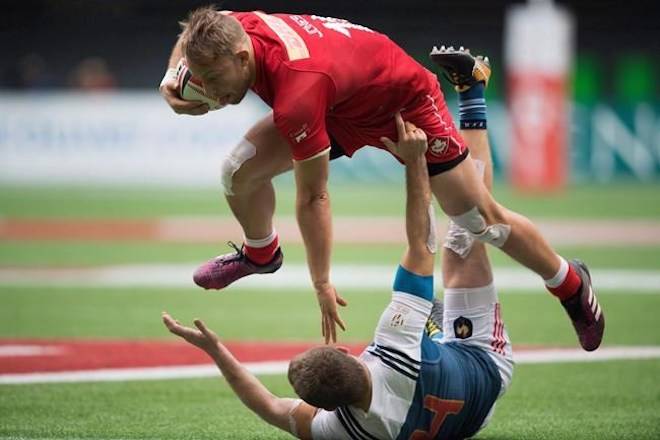Rugby Canada’s plan to have one centralized pool of men’s players rather than having separate 15s and sevens training squads is off to a rocky start.
A source said 13 of the sevens players have boycotted training in suburban Victoria and secured legal representation out of concerns their pay is being reduced and their side of the sport is being minimized.
Several months of back and forth between Rugby Canada and the player dissidents have not solved the impasse.
The sevens players’ previous contracts expired at the end of August and they are balking at the new version. Rugby Canada CEO Allen Vansen acknowledges that some of the sevens players are being offered less compensation, saying it is necessary in order to spread the organization’s limited resources among the entire player pool.
Vansen, while sympathetic to those whose lot is changing under the new framework, says Rugby Canada has no alternative. And that it would move on as needed to field a team if the current crop of sevens players continue to dig their heels in.
Co-captains Nate Hirayama and Harry Jones, meanwhile, took to social media to bang the drum for the sevens game — seen as taking a back seat to the 15s game under the reorganization.
“It’s 2018. 7s is no longer just a development tool. We have to get with the times or we’re going to get left behind,” Hirayama tweeted above a picture of the Canadian team celebrating its victory at the 2017 Singapore Sevens.
Jones’s tweet contained another photo of Singapore celebrations that showed the players hoisting coach Damian McGrath in the air.
“These players and staff have dedicated their lives and careers for moments like these. All we want is to keep chasing our dreams,” Jones said.
The sevens team members are looking into forming a players’ association, a move Vansen said Rugby Canada would not oppose.
Related: Canada men’s rugby team beats Brazil for it’s first win in the ARC
Related: Rugby Canada receives funding for goal of earning World Cup berth
These players and staff have dedicated their lives and careers for moments like these. All we want is to keep chasing our dreams. pic.twitter.com/ZNFfoq59sv
— Harry Jones (@jonesharry3) September 5, 2018
In August, Rugby Canada announced it would centralize a group of 40 to 50 men under contract “to maximize the development of Canada’s men’s national team players.”
The two squads essentially have trained apart in Langford, B.C., with separate coaches — with some 17 carded athletes in the sevens squad and up to 30 non-carded players in the 15s — although there has been some movement between the two. Canada’s top 15s talent plays professionally overseas.
The reorganization is an admission that Canada does not have the depth to run the two programs separately — and also that Rugby Canada has to focus more on the 15s program to maintain badly needed World Rugby funding.
The reorganization has pitted the 15s against the sevens with a source describing the current situation as “toxic.”
One cut reduction has the Vancouver sevens participation fee from $5,000 to $500. It is particularly galling to the seven players given the revenue the tournament produces for Rugby Canada.
Such a cut is big for players who make only $1,765 (senior) or $1,060 (developmental) a month in carding money, Rugby Canada offers a monthly “top-up” of $1,200 or $500 but, under the new blended player pool arrangement, only to a maximum of eight players for each of the senior and developmental categories per year.
The bonus structure is also modest — for example, $1,000 for qualifying for Olympics, something the men have yet to do.
Those in the sevens camp, whose ultimate goal is Olympic qualification, point to the different demands of the sevens game and say specialized training is needed. They also note the rising popularity of the sevens game.
The 15s stalwarts play down the need for special sevens training and point to the worldwide roots of the traditional version of the game.
Canada is currently ranked 23rd in the World Rugby 15s rankings. The Canadian men’s sevens squad, meanwhile, finished ninth on the 2017-18 HSBC World Sevens Series.
Rugby Canada said it will continue to pursue Olympic men’s sevens qualification, with the sevens program “also serving as a key development program” for the 15s team.
But the focus is clearly back on the 15s game. Lee Douglas, an assistant men’s sevens coach, was an early casualty of the reorganization and is no longer with Rugby Canada.
“Rugby Canada’s board of directors has clearly stated that our men’s fifteens program is the priority program for the union,” Tim Powers, chair of Rugby Canada’s board of directors, said in a statement in August. “In the environment in which we live, key core funding for our entire union is driven by our men’s fifteens performance.”
The Canadian men 15s side, which has never failed to qualify for the World Cup, is headed to a last-chance repechage tournament in November in its third and final attempt to crack the field for the 2019 World Cup.
“It’s critically important for Rugby Canada and for Canadian rugby that we continue to have a men’s 15s team that qualifies for the Rugby World Cup,” Vansen said in August.
___
Neil Davidson, The Canadian Press



